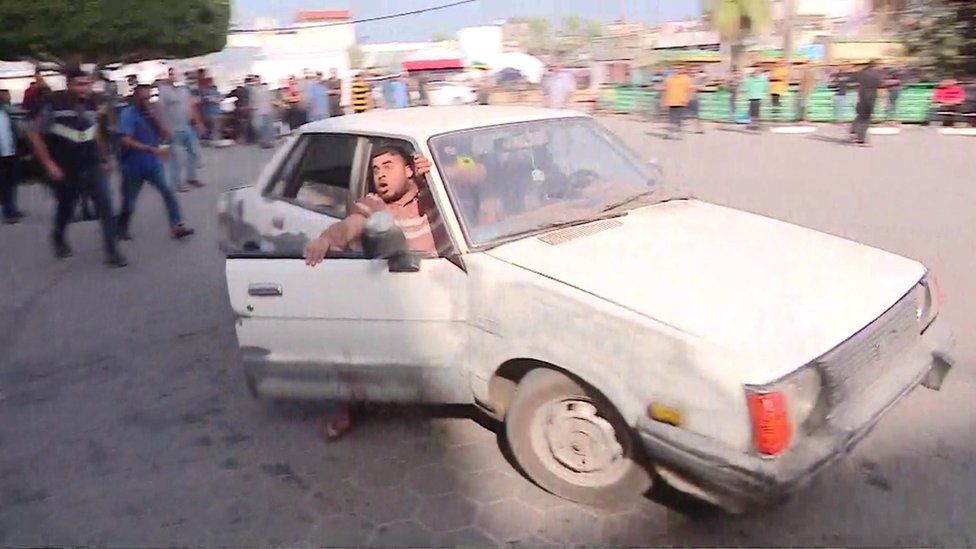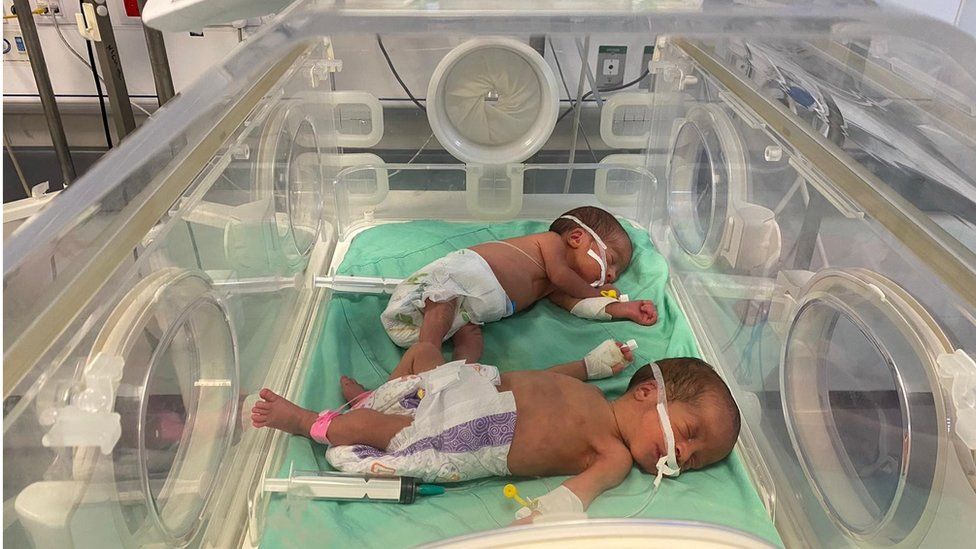
At the Al-Aqsa Martyrs hospital in central Gaza, they are running out of material to cover the dead with.
The bodies are stacked in a courtyard outside, prayers are said, and relatives collapse to the floor wailing in grief.
Inside the hospital, doctors battle to patch up the walking wounded and save the gravely injured – but stores of medicine and supplies are dwindling by the day.
A BBC Arabic reporter witnessed a facility overwhelmed with casualties where doctors were racing to finish procedures before moving on to the next patient.
Some of the images which have emerged from the hospital on Sunday are too graphic to share. Children – including at least two babies – are among the dead.
“We’ve been here since the crack of dawn and the bodies have completely filled the hospital yard, on top of the bodies which are in refrigerators which are full, inside the hospital building and outside,” a member of staff said.
“We don’t have enough shrouds for the bodies because the numbers are huge. All bodies are arriving in parts, unattached and in pieces. We can’t identify them because the bodies have been disfigured and crushed.”
He described the situation as “unbearable”, adding: “Despite everything we’ve witnessed before, these are scenes we’ve never seen.”

Similar scenes are being played out at hospitals across the territory as the Israel-Gaza war stretches into its third week.
At the al-Quds hospital in Gaza City’s Tel al-Hawa area, bombs struck nearby buildings as a team of 23 doctors and nurses treated more than 500 people, according to a message from a doctor in the hospital sent to the BBC.
Patients and civilians sheltering in the hospital were living in “a state of terror”, the doctor, who did not want to be identified for his own safety, said in a voice message.
And amid a health situation he described as “catastrophic”, doctors had to decide who to treat first. The rest join the queue.
“Many of the wounded have been waiting several days for surgery,” the doctor said. His voice message was passed on by Norwegian doctor and activist Mads Gilbert, of the Norwegian Aid Committee’s emergency team.
The medical staff has been depleted as some have been killed and others can’t reach the site. The remaining staff now share their building with 1,200 displaced people who are sheltering there.
“There are 120 wounded people with various injuries here, 10 patients are in ICU on ventilators, and we have about 400 chronic patients,” the doctor said.
“There are about 1,200 displaced citizens here – it is not easy to move such a large number of people so we decided not to evacuate.”
The Israeli military has repeated its warning to everyone in the northern Gaza Strip to head south of Wadi Gaza, a strip of wetlands that winds across the territory, for their own safety. Gaza City is to the north of Wadi Gaza, while Deir al-Balah is to the south.
Hundreds of thousands of people have fled to southern parts of Gaza, but thousands more remain in their homes in the north.
The Hamas-controlled health authority in Gaza said dozens of people were killed in another wave of air strikes overnight on Sunday. The Israeli military said it had struck more than 320 targets in the past 24 hours, including tunnels and outposts used by Hamas and its ally, Palestinian Islamic Jihad.
Hospitals across Gaza are desperate for supplies. Three small convoys of aid have so far been able to enter Gaza. Prior to the war, about 500 aid trucks a day were entering, a spokesman from ActionAid Palestine said.
Despite some food and medical supplies making it through, no fuel has entered Gaza since the conflict began. Hospitals are relying on fuel-powered generators for their electricity.

On Sunday Unicef warned that 120 babies in incubators – including 70 premature newborns also on ventilators – are dependent on machines linked up to backup generators which were deployed when Gaza’s electricity supply from Israel was switched off.
“We have currently 120 neonates who are in incubators, out of which we have 70 neonates with mechanical ventilation, and of course this is where we are extremely concerned,” said Unicef spokesman Jonathan Crickx.
Senior figures in the Israel Defense Forces have claimed Hamas hoards fuel stores for its own use rather than making it available for civilian use.
Fikr Shalltoot, Gaza director for charity Medical Aid for Palestinians, said some of the premature babies had been born amid the latest round of fighting.
“On that ward there is a 32-week-old baby who doctors managed to save after its mother was killed in an air strike,” she told the BBC. “The mother and whole family died but the baby was saved.”
She says death is certain for the child, and others on the same ward, if the generators stop running.
The fuel to keep them switched on is in short supply.

